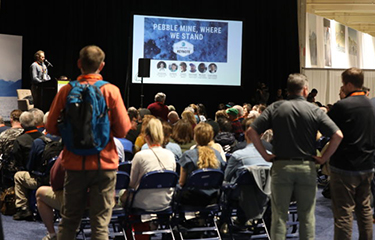A group of 32 members of the U.S. Congress have asked the U.S. Environmental Protection Agency to veto permits for Bristol Bay, Alaska’s Pebble Mine, a proposed open-pit copper and gold mine at headwaters that feed part of the world’s largest sockeye salmon fishery.
U.S. Representative Jared Huffman (D-California) and U.S. Rep. Peter DeFazio (D-Oregon) led the letter to EPA Agency Administrator Andrew Wheeler, whose agency holds the power veto the U.S. Army Corp of Engineers’ Final Draft Environmental Impact Statement, a document that has been criticized as rushed and incomplete.
“The project doesn’t meet the standards of the people of Alaska, who have made their opposition to it quite clear – opposition is consistently between 55 to 60 percent among Alaskans and the mine is opposed by Alaska Native tribes, sportsmen, fishermen, and scientists. A project of massive scale should face an incredible amount of careful scrutiny, but the permitting process led by the U.S. Army Corps of Engineers has been one of the fastest permitting processes for a project of this size under the National Environmental Policy Act,” the letter, which was signed by Huffman, DeFazio, and another 30 members of Congress, said.
Last week, the Corps issued a statement saying the mine could not go forward under its current proposal, and gave the mining company 90 days to submit a plan to mitigate environmental damage in the sparsely-populated watershed in Western Alaska.
“There is no level of compensatory mitigation that would be sufficient to address the mine’s irreversible harm to the pristine environment that exists in Bristol Bay,” the letter read.
Last week, the United Tribes of Bristol Bay released a similar statement, saying the mine could endanger the Native communities that have persisted for thousands of years in the area.
“It is thus critical that the EPA exercise its authority under the Clean Water Act and oppose the flawed environmental impact statement. The Pebble Mine would put the livelihoods, cultures, and economy of Native Tribes and Bristol Bay communities at grave risk and we urge you to fulfill your mission to protect human health and the environment,” the letter concluded.
The mining permit was submitted by Pebble Partnership, a U.S. subsidiary of Canadian company Northern Dynasty Minerals Ltd. Pebble Partnership owns the Pebble Mine mineral claims.
The state of Alaska also has veto powers through the Department of Environmental Conservation (DEC). That decision rests with the DEC Commissioner Jason Brune, a former Pebble Mine lobbyist who has expressed support for the mine in the past.
The Corps’ letter to Pebble Partnership calls for the mitigation of around 3,000 acres of wetlands and 100 miles of streams in the watershed. Mitigation plans, however, often involve improving surrounding wetlands, and biologists and activists familiar with Bristol Bay point out that there is little to be done to improve the region’s unspoiled system of lakes, rivers, and tundra.
Pebble Partnership CEO Tom Collier told North of 60 Mining News last week that the Corps’ letter was not a surprise and that his team had already been working on mitigation plans.
Photo courtesy of National Fisherman







